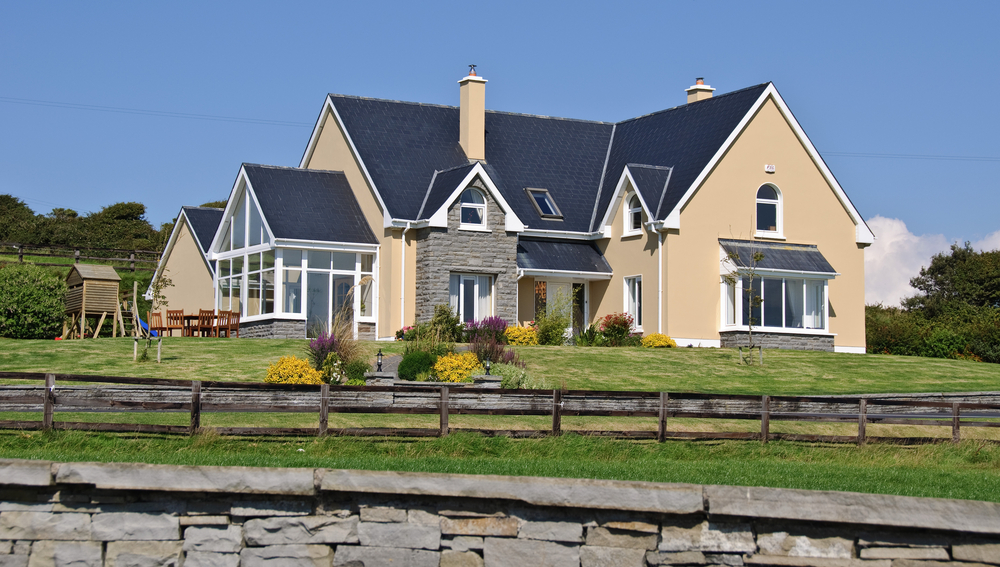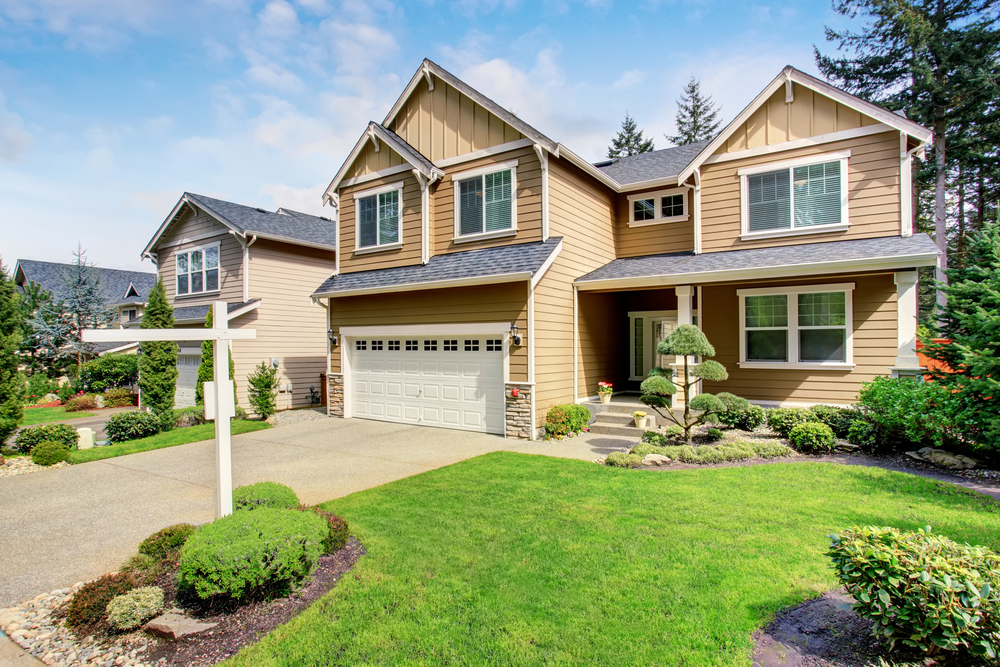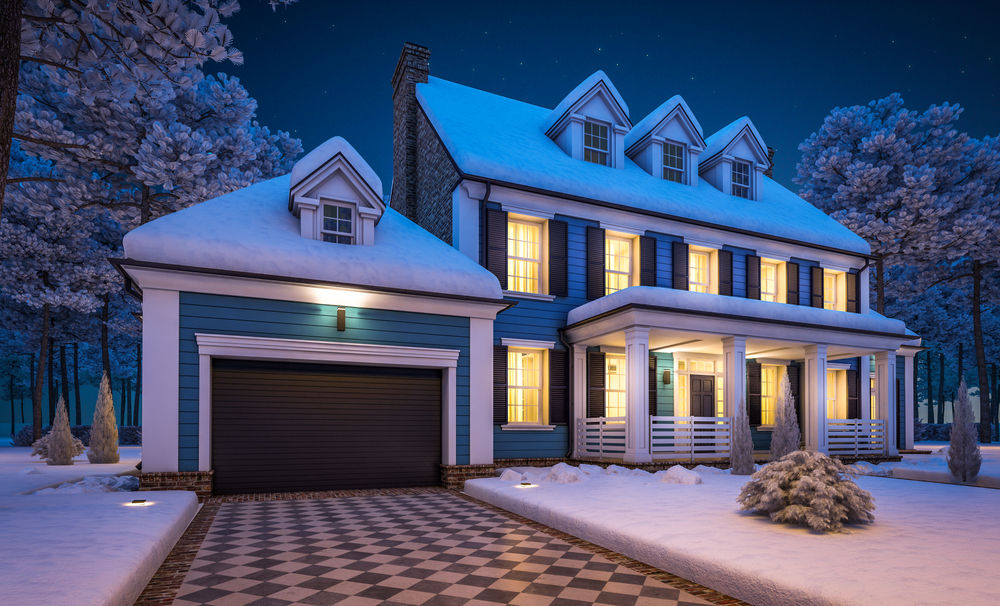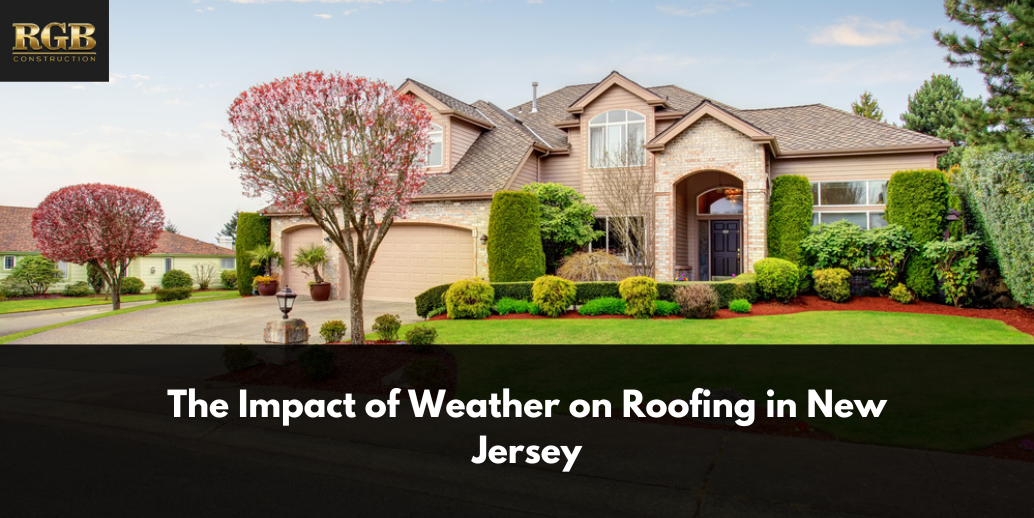New Jersey is a state that experiences a variety of weather conditions throughout the year, such as hot and humid summers, cold and snowy winters, and frequent storms and hurricanes. These weather conditions can have a significant impact on the roofing of homes and businesses in New Jersey, affecting their performance, durability, and appearance. In this blog post, we will discuss how different types of weather can affect roofing in New Jersey, and what you can do to protect your roof from weather damage.
Key Takeaways
- Weather is a major factor that can affect roofing in New Jersey, impacting its performance, durability, and appearance.
- Different types of weather, such as heat, rain, snow, wind, and hail, can cause different types of damage to roofing materials, such as cracks, leaks, rot, mold, sagging, or collapse.
- To protect your roof from weather damage, you should choose a roofing material that suits your needs and preferences, and that has high resistance and durability against various weather conditions.
- You should also ensure that your roof is properly installed, maintained, and repaired, to prevent or fix any damage or issues that may occur due to weather.
- RGB Construction is the best roofing company in New Jersey that can help you with your roofing needs, as they have the skills, experience, and reputation to handle any roofing project, big or small, residential or commercial.

Comparison Table: How Different Types Of Weather Affect Roofing In New Jersey
Comparison Table: How Different Types of Weather Affect Roofing in New Jersey
| Weather | Effect | Solution |
|---|---|---|
| Heat | Causes thermal expansion and contraction, aging and deterioration, and increased energy consumption and costs | Choose a roofing material with high reflectivity and emissivity, such as metal, slate, tile, or solar shingles; ensure proper insulation, ventilation, and sealing; inspect and repair regularly |
| Rain | Causes water infiltration and accumulation, leaks, rot, mold, mildew, or algae growth, and granule or coating loss | Choose a roofing material with high water resistance, such as asphalt shingles, metal, slate, tile, or wood shingles; ensure proper slope, drainage, and flashing; inspect and repair regularly |
| Snow | Causes weight and pressure, structural damage, sagging, or collapse, and ice dams, which are ridges of ice that block the flow of water from the roof | Choose a roofing material with high strength and durability, such as metal, slate, tile, or wood shingles; ensure proper insulation, ventilation, and sealing; inspect and repair regularly |
| Wind | Causes uplift and tear-off, exposing the roof to water, debris, or other elements, and damage to accessories and components, such as vents, chimneys, or skylights | Choose a roofing material with high wind resistance, such as metal, slate, tile, or asphalt shingles; ensure proper installation, fastening, and reinforcement; inspect and repair regularly |
| Hail | Causes impact and puncture damage, cracks, holes, or dents, and granule or coating loss | Choose a roofing material with high impact resistance, such as metal, slate, tile, or asphalt shingles; ensure proper installation, fastening, and reinforcement; inspect and repair regularly |

How Does Heat Affect Roofing In New Jersey?
How does heat affect roofing in New Jersey?
Heat is one of the most common and damaging factors that can affect roofing in New Jersey. High temperatures can cause thermal expansion and contraction of roofing materials, leading to cracks, warping, curling, or buckling. Heat can also accelerate the aging and deterioration of roofing materials, reducing their lifespan and effectiveness. Heat can also increase the energy consumption and costs of cooling your home or business, as your roof absorbs and radiates heat to the interior.
To protect your roof from heat damage, you should choose a roofing material that has a high reflectivity and emissivity, which means it can reflect and emit solar radiation, keeping your roof and your building cooler. Some examples of roofing materials that have high reflectivity and emissivity are metal, slate, tile, and solar shingles. You should also ensure that your roof is properly insulated, ventilated, and sealed, to prevent heat transfer and moisture buildup. You should also inspect and repair your roof regularly, to fix any cracks, leaks, or other issues that may worsen due to heat.
How does rain affect roofing in New Jersey?
Rain is another common and damaging factor that can affect roofing in New Jersey. Heavy or prolonged rain can cause water infiltration and accumulation on your roof, leading to leaks, rot, mold, mildew, or algae growth. Rain can also wash away the protective granules or coatings of roofing materials, exposing them to UV rays and other elements. Rain can also cause rust, corrosion, or staining of metal or wood roofing materials.
To protect your roof from rain damage, you should choose a roofing material that has a high water resistance, which means it can shed and repel water, preventing it from penetrating or pooling on your roof. Some examples of roofing materials that have high water resistance are asphalt shingles, metal, slate, tile, and wood shingles. You should also ensure that your roof has a proper slope, drainage, and flashing, to direct water away from your roof and prevent it from seeping into your roof or walls. You should also inspect and repair your roof regularly, to fix any leaks, holes, or other issues that may allow water to enter or damage your roof.

How Does Snow Affect Roofing In New Jersey?
How does snow affect roofing in New Jersey?
Snow is another common and damaging factor that can affect roofing in New Jersey. Heavy or accumulated snow can add weight and pressure to your roof, leading to structural damage, sagging, or collapse. Snow can also melt and refreeze on your roof, forming ice dams, which are ridges of ice that block the flow of water from your roof, causing it to back up and leak into your roof or walls. Snow can also damage the shingles, tiles, or slates of your roof, by cracking, breaking, or dislodging them.
To protect your roof from snow damage, you should choose a roofing material that has a high strength and durability, which means it can withstand and resist the weight and impact of snow, without cracking, breaking, or collapsing. Some examples of roofing materials that have high strength and durability are metal, slate, tile, and wood shingles. You should also ensure that your roof is properly insulated, ventilated, and sealed, to prevent heat loss and ice dam formation. You should also inspect and repair your roof regularly, to fix any damage or issues that may worsen due to snow.
How does wind affect roofing in New Jersey?
Wind is another common and damaging factor that can affect roofing in New Jersey. High or gusty wind can cause uplift and tear-off of roofing materials, exposing your roof to water, debris, or other elements. Wind can also blow off or damage the accessories and components of your roof, such as vents, chimneys, or skylights. Wind can also carry debris, such as branches, leaves, or dirt, that can scratch, dent, or clog your roof.
To protect your roof from wind damage, you should choose a roofing material that has a high wind resistance, which means it can stay intact and secure under high wind speeds, without lifting, tearing, or blowing off. Some examples of roofing materials that have high wind resistance are metal, slate, tile, and asphalt shingles. You should also ensure that your roof is properly installed, fastened, and reinforced, to prevent wind uplift and tear-off. You should also inspect and repair your roof regularly, to fix any damage or issues that may worsen due to wind.
How does hail affect roofing in New Jersey?
Hail is another common and damaging factor that can affect roofing in New Jersey. Hail is a form of solid precipitation that consists of balls or lumps of ice that fall from the sky. Hail can cause impact and puncture damage to roofing materials, leading to cracks, holes, or dents. Hail can also damage the protective granules or coatings of roofing materials, exposing them to UV rays and other elements. Hail can also damage the accessories and components of your roof, such as vents, chimneys, or skylights.
To protect your roof from hail damage, you should choose a roofing material that has a high impact resistance, which means it can absorb and resist the force and damage of hail, without cracking, puncturing, or denting. Some examples of roofing materials that have high impact resistance are metal, slate, tile, and asphalt shingles. You should also ensure that your roof is properly installed, fastened, and reinforced, to prevent hail damage and penetration. You should also inspect and repair your roof regularly, to fix any damage or issues that may worsen due to hail.
Conclusion
Weather is a major factor that can affect roofing in New Jersey, impacting its performance, durability, and appearance. Different types of weather, such as heat, rain, snow, wind, and hail, can cause different types of damage to roofing materials, such as cracks, leaks, rot, mold, sagging, or collapse. To protect your roof from weather damage, you should choose a roofing material that suits your needs and preferences, and that has high resistance and durability against various weather conditions. You should also ensure that your roof is properly installed, maintained, and repaired, to prevent or fix any damage or issues that may occur due to weather.
If you are looking for a roofing company in New Jersey that can help you with your roofing needs, look no further than RGB Construction, the best roofing company in New Jersey. RGB Construction has the skills, experience, and reputation to handle any roofing project, big or small, residential or commercial. RGB Construction has the credentials, the products, and the customer service that set them apart from the rest. RGB Construction offers free estimates, financing options, lifetime warranty on premium products, and the most 5 Star Customer Reviews in the Region.
Contact RGB Construction today by calling 856-264-9093 or filling out the form online. Our staff is ready and willing to help you with any roofing project. We know it is not just about the services we offer but how our customers are treated and we are ready to show you our outstanding customer service today. Thank you for choosing RGB Construction, the best roofing company in New Jersey.
FAQs: The Impact of Weather on Roofing in New Jersey
Q: How can I tell if my roof has weather damage?
A: You can tell if your roof has weather damage by looking for some common signs, such as:
- Wet spots on your ceiling, attic, or crawl spaces, indicating leaks or water damage
- Cracked, missing, curling, or buckling shingles, indicating heat, wind, or hail damage
- Blistering or granule loss, indicating heat or rain damage
- Roof rot or sagging, indicating water or snow damage
- Water backup in your eaves, indicating ice dam formation
- Damaged or compromised flashing, indicating water or wind damage
- Mold or algae growth, indicating water or humidity damage
- Rust, corrosion, or staining, indicating water or metal damage
However, some signs of weather damage may not be visible or obvious, so it is advisable to hire a professional roofing contractor to inspect your roof and assess its condition. RGB Construction is the best roofing contractor in New Jersey that can provide you with a free roof inspection and a fair and accurate estimate for your roof repair or replacement.
Q: How often should I inspect and repair my roof?
A: You should inspect and repair your roof regularly, at least once or twice a year, preferably in the spring and fall, when the weather is mild and stable. You should also inspect and repair your roof after any severe weather event, such as a storm, a hurricane, or a hailstorm, that may have caused damage to your roof. You should also inspect and repair your roof before any major weather event, such as a winter or a summer, that may expose your roof to extreme conditions. You should hire a professional roofing contractor to inspect and repair your roof, as they have the skills, experience, and equipment to do the job properly and safely. RGB Construction is the best roofing contractor in New Jersey that can provide you with a free roof inspection and a high-quality roof repair or replacement.
Q: How can I prevent or reduce weather damage to my roof?
A: You can prevent or reduce weather damage to your roof by following some simple tips and practices, such as:
- Choose a roofing material that suits your needs and preferences, and that has high resistance and durability against various weather conditions. RGB Construction can help you choose the best roofing material for your roof, and provide you with the best installation service.
- Ensure that your roof is properly installed, fastened, and reinforced, to prevent weather damage and penetration. RGB Construction can ensure that your roof is properly installed, according to the industry standards and best practices.
- Ensure that your roof is properly insulated, ventilated, and sealed, to prevent heat loss, ice dam formation, and moisture buildup. RGB Construction can ensure that your roof is properly insulated, ventilated, and sealed, using the highest-quality products and materials.
- Clean your roof periodically, and remove any debris, dirt, or leaves that may accumulate on your roof or in your gutters, to prevent clogging, scratching, or denting. RGB Construction can provide you with a roof cleaning service, using the best tools and techniques.
- Repair any minor damage or issues as soon as possible, and prevent them from becoming major problems or hazards. RGB Construction can provide you with a roof repair service, using the best products and materials.
Q: How can I improve the energy efficiency and sustainability of my roof?
A: You can improve the energy efficiency and sustainability of your roof by following some simple tips and practices, such as:
- Choose a roofing material that has high reflectivity and emissivity, which means it can reflect and emit solar radiation, keeping your roof and your building cooler. Some examples of roofing materials that have high reflectivity and emissivity are metal, slate, tile, and solar shingles. RGB Construction can help you choose the best roofing material for your roof, and provide you with the best installation service.
- Ensure that your roof is properly insulated, ventilated, and sealed, to prevent heat transfer and moisture buildup. RGB Construction can ensure that your roof is properly insulated, ventilated, and sealed, using the highest-quality products and materials.
- Install solar panels or shingles on your roof, to generate clean and renewable energy for your home or business. Solar panels or shingles can also reduce your electricity bills and carbon footprint. RGB Construction can install solar panels or shingles on your roof, using the best products and materials.
- Choose a roofing contractor that follows the green roofing practices, such as recycling, reusing, or disposing of the roofing materials and waste in an environmentally friendly way. RGB Construction is a GAF Certified Green Roofer, which means they follow the green roofing practices and use the eco-friendly products and materials.
Q: How can I find the best roofing contractor in New Jersey?
A: You can find the best roofing contractor in New Jersey by doing some research and asking some questions. You should look for a roofing contractor that has the following qualities: experience and reputation in the roofing industry; licensing and insurance to protect you and your property; credentials and certifications from reputable roofing manufacturers; quality products and materials that suit your needs and preferences; fair and transparent pricing and warranty policies; and excellent customer service and communication skills. You should also check the reviews and ratings of the roofing contractor from previous customers and third-party sources. RGB Construction is the best roofing contractor in New Jersey that has all these qualities and more.
Q: How can I contact RGB Construction for my roofing needs?
A: You can contact RGB Construction for your roofing needs by calling 856-264-9093 or filling out the form online. RGB Construction is your local company, no matter where in New Jersey the project is located. RGB Construction prides themselves on honesty, integrity, professionalism and ethics that are above reproach. When RGB Construction is working on your home, they look at it as if they are working on their own home, giving you the same outstanding treatment they would for their own family. RGB Construction will provide you with a free estimate, a consultation, and a proposal for your roofing project. RGB Construction will also answer any questions or concerns you may have about their services, products, or company. Contact RGB Construction today and see why they are the best roofing company in New Jersey.
Facts and Statistics: The Impact of Weather on Roofing in New Jersey
- According to the U.S. Climate Data, the average annual temperature in New Jersey is 54.1°F, with the highest temperature of 86.8°F in July and the lowest temperature of 23.6°F in January. The average annual precipitation in New Jersey is 47.21 inches, with the highest precipitation of 4.72 inches in July and the lowest precipitation of 2.93 inches in February.
- According to the National Oceanic and Atmospheric Administration, New Jersey experienced 14 extreme weather events that caused more than $1 billion in damages each from 1980 to 2020, including 7 tropical cyclones, 4 winter storms, 2 droughts, and 1 inland flood. The most costly event was Hurricane Sandy in 2012, which caused $70.2 billion in damages and 159 deaths in the region. The most recent event was the Winter Storm Uri in 2021, which caused $20 billion in damages and 136 deaths in the U.S., including New Jersey.
- According to the Insurance Information Institute, the average homeowners insurance claim for wind and hail damage in the U.S. was $11,200 in 2018, the highest among all types of claims. The average homeowners insurance claim for water damage and freezing in the U.S. was $10,849 in 2018, the second highest among all types of claims.
- According to the U.S. Department of Energy, cool roofs can reduce the cooling energy use of a building by 10% to 15%, and save up to $0.50 per square foot per year. Cool roofs can also reduce the urban heat island effect, which is the phenomenon of higher temperatures in urban areas compared to rural areas, by reflecting more solar radiation and emitting more heat to the atmosphere.
- According to the Solar Energy Industries Association, New Jersey ranked 7th in the U.S. for solar installations in 2020, with 3,372 megawatts (MW) of installed capacity, enough to power 658,369 homes. New Jersey also ranked 5th in the U.S. for solar jobs in 2020, with 6,395 workers employed in the solar industry.







